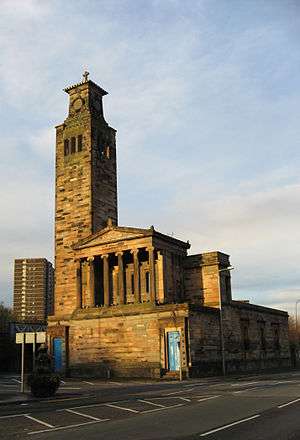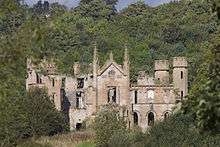Buildings at Risk Register for Scotland
The Buildings at Risk Register for Scotland records buildings of national architectural or historic interest which are considered to be under threat. The list is maintained by Historic Environment Scotland (HES). The register was established in 1990, with the purpose of raising awareness of the threats to Scotland's built heritage. It was maintained by the Scottish Civic Trust until 2011, then by RCAHMS until that body became part of HES in 2015.[1]

The register comprises mainly listed buildings, that is buildings of "special architectural or historic interest",[2] but may also include unlisted buildings which are within conservation areas.[3] Other heritage assets, such as scheduled monuments, are not considered for inclusion on the register. Buildings are considered to be 'at risk' if they are under threat from demolition or neglect. The following criteria are among those used when considering buildings for inclusion:
- "vacant with no identified new use
- suffering from neglect and/or poor maintenance
- suffering from structural problems
- fire damaged
- unsecured and open to the elements
- threatened with demolition" [3]

The register is continuously updated: newly identified 'at risk' buildings being added; while other are removed either due to restoration or demolition. The Buildings at Risk Register website maintains a list of 'success stories', showcasing examples of buildings which have been restored or brought back into use.[5] In 2013, 8% of Scotland's category A listed buildings, i.e. those of national importance, were on the Buildings at Risk Register, down from 8.7% in 2009.[6] For each building on the register descriptive information is provided, and an assessment given of the condition of the building (from 'good' to 'ruinous') and the 'category of risk' (from 'minimal' to 'critical').[7] The register summarises the 'development history' of each building, detailing the progress of any restoration or other proposals.
See also
- Heritage at Risk Register, the equivalent list in England
References
- "Changes at the Buildings at Risk Register as of 1 April 2011". Buildings at Risk Register for Scotland: News. RCAHMS. Retrieved 28 October 2013.
- Guide to the Protection of Scotland’s Listed Buildings (PDF). Historic Scotland. 2009. p. 4. ISBN 978-1-84917-013-0. Retrieved 5 May 2010.
- "Frequently Asked Questions: What is a building at risk?". Buildings at Risk Register for Scotland. RCAHMS. Retrieved 28 October 2013.
- "Cambusnethan Priory". Buildings at Risk Register for Scotland. RCAHMS. Retrieved 28 October 2013.
- "Success Stories". Buildings at Risk Register for Scotland. RCAHMS. Retrieved 28 October 2013.
- "National Indicator: Improve the state of Scotland's historic sites". Scottish Government. Retrieved 28 October 2013.
- "Frequently Asked Questions: How does the Buildings at Risk Service assess condition?". Buildings at Risk Register for Scotland. RCAHMS. Retrieved 28 October 2013.